2009 Schedule
May 23 |
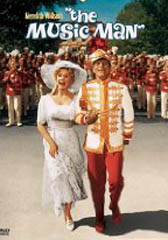 |
The Music Man . The Music Man was one of the last great movie musicals from any studio, and it proved to be that rarest of events: a Broadway show that was measurably improved by its transition to the screen. Robert Preston made his musical debut--both live and on film--as "Professor" Harold Hill, the upbeat charlatan who promises to teach a small-town boys band by the "think system." But it's the part Preston was born to play and the one for which he will always be best remembered. Composer Meredith Willson based The Music Man on his own small-town Midwestern boyhood, circa 1912, a quasi-mythical place where the old-maid librarian looks and sings like Shirley Jones. The boy himself is an adorable Ron Howard, lisp-singing "Gary, Indiana." Willson's entire score, featuring a combination of what are now standards, such as "Goodnight My Someone" and "Till There Was You" and show-specific numbers ("Trouble," "76 Trombones"), is never less than infectious. This dazzling special edition is also as bright and sunny as any 4th of July in Iowa could ever hope to be. Run time: 151 minutes. |
| June 20 |
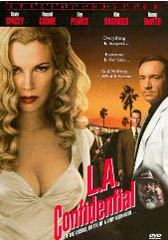 |
LA Confidential. In a time when it seems that every other movie makes some claim to being a film noir, L.A. Confidential is the real thing--a gritty, sordid tale of sex, scandal, betrayal, and corruption of all sorts (police, political, press--and, of course, very personal) in 1940s Hollywood. The Oscar-winning screenplay is actually based on several titles in James Ellroy's series of chronological thriller novels (including the title volume, The Big Nowhere, and White Jazz)--a compelling blend of L.A. history and pulp fiction that has earned it comparisons to the greatest of all Technicolor noir films, Chinatown. Kim Basinger richly deserved her Supporting Actress Oscar for her portrayal of a conflicted femme fatale; unfortunately, her male costars are so uniformly fine that they may have canceled each other out with the Academy voters: Russell Crowe, Guy Pearce, Kevin Spacey, and James Cromwell play LAPD officers of varying stripes. Pearce's character is a particularly intriguing study in Hollywood amorality and ambition, a strait-laced "hero" (and son of a departmental legend) whose career goals outweigh all other moral, ethical, and legal considerations. If he's a good guy, it's only because he sees it as the quickest route to a promotion. Run time: 138 minutes. |
| June 27 |
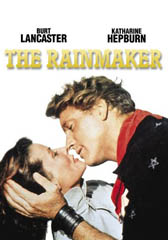 |
The Rainmaker. This 1950s classic is based on the N. Richard Nash play of the same
name (and not to be confused with the John Grisham novel and subsequent
film). It's drought time in the Southwest; things are so bad that when
a con man (Burt Lancaster) comes to town promising he can make rain, a
rancher takes him up on it. But the rancher's spinster daughter
(Katharine Hepburn) is skeptical--until Lancaster makes lightning
strike her heart, with the unexpected consequence of the rainmaker
falling in love with her. Lancaster is charismatic and funny and finds
his match in Hepburn (with Earl Holliman providing comic relief as her
impulsive younger brother). Think Harold Hill and Marian the Librarian
on a farm, minus the music (though Rainmaker later was made into the Broadway musical 110 in the Shade). Run time: 135 minutes. |
| July 11 |
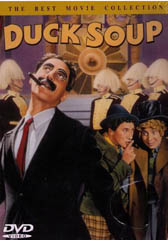 |
Duck Soup. To gain financial support from Mrs. Teasdale (Margaret Dumont), the tiny bankrupt country of Freedonia agrees to take Rufus T. Firefly (Groucho Marx) as their new president (the poor saps). Mayhem springs from Firefly's cynical and sarcastic leadership, culminating in war with the neighboring country of Sylvania. Throughout, Pinky (Harpo Marx) and Chicolini (Chico Marx) are scheming among the great and powerful, taking money from Trentino (Louis Calhern) of Sylvania, and directing Firefly's war effort. This movie contains some of Groucho's funniest witticisms, his badinage
with Margaret Dumont producing some of the funniest lines in theatrical
history. The story takes something of a backseat to the Marx brother's
comedy, but this movie is first and foremost a satire of politics in
general, and war and patriotism in particular. Back to the comedy, this
movie is fantastically funny, containing the famous mirror scene, where
Chico is dressed as Groucho, who must figure out if he is seeing his
reflection or something else!
This is a great movie. The comedy is funny and clean, and can be watched by viewers of any age. Run time: 68 minutes. |
| July 25 |
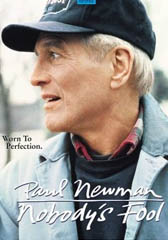 |
Nobody's Fool. "Worn to perfection" is the tag line promoting this crafted character study. It describes Paul Newman, the resourceful 70-year-old lead actor, but not his character, Sully, a North Bath, New York, loner who totally emulates the negative definition of the title. Newman gives a brilliant performance (Oscar-nominated and winner of two critics circle awards) relying on his well-honed subtleties. The dramatics are simple: the return of his son (Dylan Walsh) and grandson, offering a chance to reconcile; odd jobs for a construction company he's trying to sue for an injury; and a comedic grudge match against the owner (a reserved Bruce Willis). North Bath is the kind of place, wrapped in winter (beautifully shot by John Bailey), where enemies are friends, marriages are shaky, and Hawaii is only a state of mind. This "town drama" of a blue-collar America offers the patient filmgoer a rich and rewarding experience. Another small gem from writer-director Robert Benton (Places in the Heart). Run time: 110 minutes. |
| August 8 |
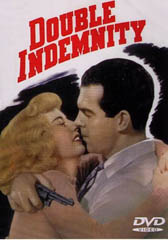 |
Double Indemnity.
Double Indemnity is one of those rare gems in Old Hollywood History.
The film stars Barbara Stanwyck, as a woman fed up with her
husband, and wants to get rid of him- with the help of an insurance salesman--Walter Neff aka "Walta". Fred MacMurray's usual golden boy image in films is transformed into a man who would do anything for a blonde with an ankle bracelet. The usual mobster in pictures, Edward G. Robinson, plays the honest claims adjuster, who has no idea just how things will transpire. See this movie, if not for the "action and drama", but for Barbara's sly and sassy line delivery, with her delightful polished Brooklyn accent. The film was directed by Billy Wilder in 1944. Run time: 107 minutes.
|
| Sept. 5 |
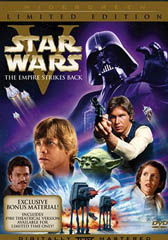 |
Star Wars--The Empire Strikes Back. A long time ago, in a galaxy far, far away, it is a dark time for the
rebellion. Luke Skywalker and his friends have set up a new base on the
ice planet of Hoth, but it is not long before their secret location is
discovered by the evil Empire. After narrowly surviving an attack by a
Wampa snow-beast, Luke and the rebels must flee the invading Imperial
Forces, but not without putting up a fight first. What follows is a
fantastic battle between snowspeeders and huge, 4-legged walking
machines called AT-ATs, a necessary defensive in order to allow the
large rebel transports to get away. In the mayhem of escape, however,
the tight-knit group of friends, Han Solo, Chewbacca, Princess Leia
Organa, C-3PO, R2-D2, and of course Luke Skywalker, must divide. While
struggling to survive in the harsh snow of Hoth, Luke had earlier
received a visitation from the spirit of his old teacher, Obi-Wan
Kenobi, instructing him to go to the Dagobah system and seek out a Jedi
Master called Yoda to continue his training. With R2 as his co-pilot,
Luke departs Hoth in his X-Wing Fighter for the mysterious destination,
while Leia is forced to escape with Han, Chewie, and 3PO in the
Millennium Falcon, a ride she is less than pleased to take. Run time: 124 minutes. |
| Sept. 19 |
 |
Rocky. The only remaining evidence that Sylvester Stallone might have had a
respectable career, this 1976 Oscar winner (for Best Picture, Director,
and Editing) is still the quintessential ode to an underdog and one of
the best boxing movies ever made. After writing the script about a
two-bit boxer who gets a "million-to-one shot" against the world heavyweight champion, Stallone insisted that he star in the title role, and his equally unknown status helped to catapult him (and this rousing film) to overnight success. The story is familiar, but it has been handled with such vitality and emotional honesty that you can't help but leap and cheer for Rocky Balboa, the chump turned champ (despite his valiant defeat in the ring) who stuns the boxing world with the support of his timid girlfriend, Adrian (Talia Shire), and grizzled trainer, Mickey (Burgess Meredith). Oscar nominations went to all the lead actors (including Burt Young as Adrian's hot-tempered brother), but four sequels could never top the universal appeal of this low-budget crowd pleaser. Run time: 119 minutes. |
| Oct. 3 |
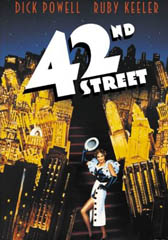 |
42nd Street. Set during the depression, this is the granddaddy of backstage musicals
in which the understudy finally gets a chance to shine. It may seem a
little cliché now, but in 1933 this was hot stuff. All that behind-the-scenes atmosphere feels very genuine, and the script is more acerbic than you might expect.
A sickly Julian Marsh (Warner Baxter) puts his all into what may be his last show, only to face a disaster when leading lady Dorothy Brock (Bebe Daniels) sprains her ankle. Thank heavens for ingenue Peggy Sawyer (Ruby Keeler), who steps in at the last minute. The vivacious soundtrack includes "Shuffle off to Buffalo," and the still-catchy title tune. Best of all are those extravagant, kaleidoscopic dance numbers by Busby Berkeley, then in his prime. Run time: 89 minutes. |
HOME | DIRECTIONS
SCHEDULES FOR PREVIOUS YEARS
|

